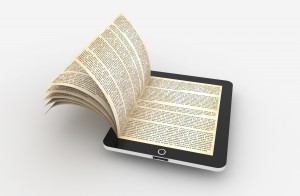Print: For Better Studying and Sleep
We’ve talked a lot in our blog about how there are lots of benefits to reading on paper versus reading on a screen. Research suggests that readers get more information and retain it better when they consume it on print versus on a screen. And despite the rise in popularity of ebooks, print book sales still make up a solid majority of the market.
Now, two more data points are suggesting that print is still the way to go. Learn more about how print is helping college students study and how it’s helping everyone sleep!

Print: The Studying Material of Choice
Students today have tons of options when it comes to consuming written information. Laptops, tablets, and smartphones are ubiquitous on college campuses today. But despite this, students are still choosing to read and write in print for a majority of their academic activities.
A survey of 1,200 college students in 100 colleges in the U.S. conducted by Student Monitor found that students preferred print over using their laptop for a number of academic activities, including class notes, problem sets, textbooks, and other reading. The only area in which laptops had a far and away lead was research. And with so much information available online and obtainable in seconds, it makes sense that students aren’t making the hike over to the library like they did in the past. Nevertheless, students still use print for lots of their schoolwork, and rightly so, considering it may help them to retain information better!
Print: Helping You Sleep
In other recent good news for print, new research suggests that you may have an easier time falling asleep at night after reading a print book vs. an e-book. Not only that, but the quality of your sleep may be better. The study, conducted at the Brigham and Women’s Hospital in Boston, involved 12 participants. Half read print books for 5 nights in a row before going to bed, and half read e-books. After 5 nights, the two groups switched. The results showed that in both cases, the group reading e-books before bed took longer to fall asleep and spent less time in the REM stage. REM sleep is the stage of sleep where dreaming occurs, and it’s also where you get the most restorative sleep of the night. E-book readers also felt more tired when they woke up, and it took longer for them to feel totally awake and alert than it did print readers.
Whether it’s for better sleep or better studying, the choice is clear: printed material is still the way to go!
